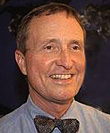'Planet doctor' warns that climate change will wipe out entire species
By Sandra Holley

Ecologists and conservationists are increasingly serving as "planet doctors" who worry about how the health of entire ecosystems is challenged by climate change, said Thomas Lovejoy, speaking to about 65 people sitting in the shadow of a hanging 40-foot-long North Atlantic right whale skeleton at the Museum of the Earth, April 18.
"The global temperature is currently three-quarters of a degree higher than it was during pre-industrial times," said Lovejoy, a conservation biologist presenting the talk, "Climate Change: Prospects for Nature," as part of the museum's Earth Day celebrations. However, with the current concentration of greenhouse gases in the atmosphere, we are already committed to an equal amount of temperature increase -- even if we stop increasing greenhouse gases today."
Lovejoy is credited with putting the plight of rain forests on the world's radar in the early 1980s and for coining the term "biological diversity." He founded the PBS series "Nature" and has advised the World Bank and United Nations on biodiversity issues. He also directed the World Wildlife Fund from 1987 to 1998.
A one-and-a-half degree increase in global temperature will be enough to cause significant negative effects on a variety of plant and animal species, said Lovejoy, now the president of the Heinz Center for Science, Economics and the Environment.
Coral reefs, he said, are especially hard hit by climate change. "It's not a very encouraging picture for the future of tropical coral reefs. The Technicolor world of the coral reef goes to black and white."
The Intergovernmental Panel on Climate Change predicts that a global temperature rise of 1.5 degrees will result in the bleaching and death of most, if not all, of the ocean's coral reefs.
Lovejoy also presented several examples of radical life-pattern changes as plant and animal species attempt to adapt to increasing warmth. He reported lilacs are blooming earlier in New England, and several bird species are migrating, nesting and laying eggs earlier. One hummingbird species has stopped migrating altogether.
Although Lovejoy painted a bleak picture of the impact of climate change on the natural world, he encourages hope and action, as he has been successful at pushing policymakers to focus on conservation issues and has helped develop strategies to tackle the climate crisis.
Graduate student Sandra Holley is a writer intern at the Cornell Chronicle.
Media Contact
Get Cornell news delivered right to your inbox.
Subscribe